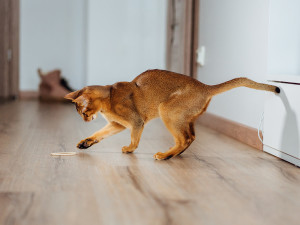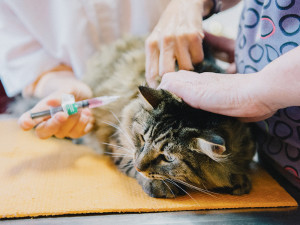Can Cats Get Covid? What Every Pet Parent Needs to Know
Expert answers on Covid-19 and cats – plus symptoms to watch out for
Whether cats can contract Covid-19 is understandably a common concern for pet parents over the last few years. Covid-19 primarily affects humans, however, our pets are part of the overall concern for household health. Awareness of how the virus spreads and ways to minimise risks to those vulnerable is important, so let’s look in more detail to see how pet parents and vets can help.
Can cats get Covid-19?
Yes, cats can contract the virus along with other animals such as dogs and ferrets. While it is possible for cats to contract SARS-CoV-2, the virus that causes Covid-19 in humans, the cases are rare and generally not severe. The Centre for Disease Control and Prevention (CDC)opens in new tab have stated that pets can contract the virus after being in close contact with humans, and the World Organisation for Animal Health (OIE)opens in new tab have documented reports of animals with the virus which includes domestic cats.
How does Covid-19 spread to cats?
Transmission of the virus to cats comes through close contact with people with Covid-19, there are limited reports of animals spreading the virus to humans and the CDC have stated there is no evidence that animals play a significant role in spreading Covid-19 to people.
Can cats spread Covid-19 to other animals or people?
Humans are far more likely to get Covid-19 from other people rather than transmission from animals, so human-to-human transmission is the primary concern for the spread of the virus. There is some evidence that other animals can spread the virus through close contact with their own species in captivity, but there is only limited evidence of transmission from animal to human.
The cases that have been seen are mainly linked with farmed minkopens in new tab after being in contact with an infected human originally. This means that even if they contract the virus, the risk of your cat passing it to human members of the family is low.
However, pets can act as carriers for the virus, transmitting the virus mechanically as it sits on their fur after being in contact with an infected human. This is known as fomite transmissionopens in new tab, and is just the same as when the virus can stay on other surfaces for a short time.
Covid-19 symptoms in cats
As we have seen with humans, not everyone with the virus becomes unwell – and the same goes for cats. Of the pets that do become unwell the symptoms are usually mild and pass within a few days. Serious illness of Covid-19 in pets is extremely rare.
Symptoms include:
What to do if your cat shows Covid-19 symptoms?
If your pet is showing any of these symptoms please contact your vet to discuss investigation and treatment. Usually if Covid-19 is confirmed, symptoms can be treated at home but they may need additional medical treatment if symptoms become worse. If your cat is having any difficulty breathing it is essential you contact your vet as soon as possible.
If you yourself are sick with Covid-19 and your cat becomes unwell, call your vet practice before taking them in as they may be able to offer advice remotely or have additional protocols in place.
How to protect your cat from Covid-19
To limit the spread at home it is important to maintain good hygiene around your cat. Anyone who has Covid-19 should limit contact with pets to also reduce fomite transmission risk to other humans. If you have sole responsibility for the pet then wash your hands before and after touching them. If your cat starts to show symptoms, keep them inside and ensure that the entire household maintains these recommendations until at least 72 hours after symptoms resolve.
Should you test your cat for Covid-19?
Leading health authorities advise against testing asymptomatic animals, and even in those pets that are showing symptoms the cause is much more likely to be a more common respiratory infection instead of Covid-19. Guidance from the Animal and Plant Health Agency (APHA)opens in new tab and the Royal College of Veterinary Surgeons (RCVS)opens in new tab advise that testing for SARS-CoV-2 in pets should only be done in pets where it is in the interest of the health and welfare of the animal, and it is not used as a screening test.
The need for testing in pets is rare but can be done through your vet practice if necessary. The specimens that are needed for the test involve a deep pharyngeal swab, along with a conjunctival and a rectal swab.
Frequently asked questions
Can my cat catch Covid from me?
Yes, it is possible for your cat to catch Covid from humans however these cases are rare and rarer still for the animal to become seriously ill.
Can I pet my cat if I have Covid-19?
It is best to limit contact with your pet if you have Covid, not only for the rare cases of transmission to your pet, but also to limit fomite transmission where the virus sits on your pets fur and can spread to other humans through close contact.
Should I vaccinate my cat against Covid-19?
There is no vaccination for Covid-19 licensed for cats, as there is little evidence it would help stop the spread of the virus. There is a more common cat coronavirus which causes Feline Infectious Peritonitis (FIP) which is included within your pets yearly booster vaccinations as it is fatal if untreated.
Do cats with Covid-19 need to be quarantined?
If you suspect your cat has Covid-19 keep them inside to limit spread to other cats and contact your vet for advice, maintain good hygiene by washing your hands before and after touching your pet until at least 72 hours after symptoms resolve.
Resources
What You Should Know about COVID-19 and Petsopens in new tab
SARS-CoV-2 - WOAH - World Organisation for Animal Healthopens in new tab
Assessing the potential for fomite transmission of SARS-CoV-2 - The Lancet Microbeopens in new tab






